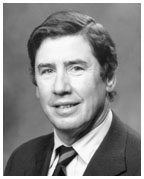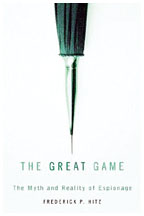April 21, 2004: Reading Room

Frederick Hitz ’61 describes the real-life drudgery and treachery of spying. (Photo by Alfred A. Knopf)
|
The
spy game
Frederick P. Hitz ’61 compares the fiction
and reality of espionage
By Maria LoBiondo
Forget James Bond. Real spying is more psychology than flashy technology, more day-to-day doggedness than jet-setting.
So says Frederick P. Hitz ’61, and he should know. Hitz spent more than 20 years with the C.I.A., from overseeing agents in West Africa to investigating the agency itself as its inspector general from 1990 to 1998.
But Hitz agrees that Bond and spy novels entertain. He’s a fan of John le Carré, Graham Greene, and others who have captured the muddled morality inherent in intelligence-gathering. To show how close these authors come to the mark, Hitz has written The Great Game: The Myth and Reality of Espionage, published by Alfred A. Knopf this month. The C.I.A. insider compares spy fiction and fact, just as he does in the freshman seminar he’s taught five times as a lecturer in the Woodrow Wilson School.
Spy fiction comes pretty close to the real thing, he argues, but doesn’t fully convey the drudgery involved.
 “Because
so many students have a notion of James Bond as what spying is like, I
wanted to get down to the nitty-gritty as well as the lying, the manipulation
of people, and breaking laws in other countries. I want people to understand
what’s involved and what’s required, skills like foreign language
competence, patience, subtlety, and working outside the limelight,”
Hitz explains.
“Because
so many students have a notion of James Bond as what spying is like, I
wanted to get down to the nitty-gritty as well as the lying, the manipulation
of people, and breaking laws in other countries. I want people to understand
what’s involved and what’s required, skills like foreign language
competence, patience, subtlety, and working outside the limelight,”
Hitz explains.
The book’s title comes from Rudyard Kipling’s Kim (1901), one of the earliest examples of solid spy drama. Kim is recruited as a British spy for “the Great Game,” to keep Britain in command on the Indian subcontinent without allowing the French or czarist Russians a foothold.
Cold War-era stories dominate Hitz’s examples. He compares the exploits of real-life spies to characters. He describes “good guys” who worked for the U.S. side, such as the Soviet colonel Oleg Penkovsky, who supplied information to the West, including a critical profile of Nikita Khrushchev that helped John F. Kennedy strategize during the Cuban Missile Crisis. Tom Clancy created a Penkovsky-like character in master skipper Marko Ramius of The Hunt for Red October (1984).
Hitz also writes about the “bad guys” who betrayed Western secrets, notably Englishman Harold “Kim” Philby, the most notorious Soviet spy in British intelligence during the Cold War and Le Carré’s model for double agent Bill Haydon in Tinker, Tailor, Soldier, Spy (1974). And Hitz looks at American Aldrich Ames; the author has the inside scoop on Ames, having overseen the investigation into how the C.I.A. ferreted him out as a counterintelligence agent.
Is reality stranger than fiction? Hitz initially suggests that readers make up their own minds, but by the epilogue his stand is clear: No character can adequately capture the twists and turns a real spy encounters in the work of betrayal and treachery.
What motivates people — real or make-believe — provides
the greatest drama, Hitz says. “It’s the complexity of human
nature that the great game is all about.” ![]()
Maria LoBiondo is an occasional contributor to PAW.
BOOK SHORTS
 Charlotte
Perriand: An Art of Living — edited by MARY MCLEOD ’72
*85 (Abrams). This collection of essays covers Perriand’s career
as a furniture and interior de-signer. Many of her pieces are now seen
as classics of modern furniture. Perriand, who died in 1999, thought good
furniture design should be accessible to working and middle-class people.
An exhibition of her work is on view at the Princeton Art Museum through
July 11. McLeod is a professor of architecture in the Graduate School
of Architecture, Planning, and Preservation at Columbia University.
Charlotte
Perriand: An Art of Living — edited by MARY MCLEOD ’72
*85 (Abrams). This collection of essays covers Perriand’s career
as a furniture and interior de-signer. Many of her pieces are now seen
as classics of modern furniture. Perriand, who died in 1999, thought good
furniture design should be accessible to working and middle-class people.
An exhibition of her work is on view at the Princeton Art Museum through
July 11. McLeod is a professor of architecture in the Graduate School
of Architecture, Planning, and Preservation at Columbia University.
The Murder of Mr. Grebell: Madness and Civility in an English Town — PAUL KLÉBER MONOD ’78 (Yale). Monod’s book explores the 1743 murder of a local magistrate by an angry butcher in the English port town of Rye. The identity of the killer is known but not his motive. Monod traces Rye’s history and its religious and social tensions to determine what motivated the butcher to kill one of the town’s most prominent citizens. Monod is a history professor at Middlebury College.
 I Used to
Miss Him . . . But My Aim Is Improving: Not Your Ordinary Breakup Survival
Guide — ALISON JAMES (Hovancik) ’96 (Adams Media).
Using her failed relationships as fodder, the author combines practical
advice with edgy tips (such as never sleep with an ex, and party more)
to help cure postbreakup blues. Based on the principle that disdaining
one’s ex helps women recover from a breakup, this guide reads like
an affirming pep talk. James is director of finance for A&E Television
Networks.
I Used to
Miss Him . . . But My Aim Is Improving: Not Your Ordinary Breakup Survival
Guide — ALISON JAMES (Hovancik) ’96 (Adams Media).
Using her failed relationships as fodder, the author combines practical
advice with edgy tips (such as never sleep with an ex, and party more)
to help cure postbreakup blues. Based on the principle that disdaining
one’s ex helps women recover from a breakup, this guide reads like
an affirming pep talk. James is director of finance for A&E Television
Networks. ![]()
By Lucia S. Smith ’04
